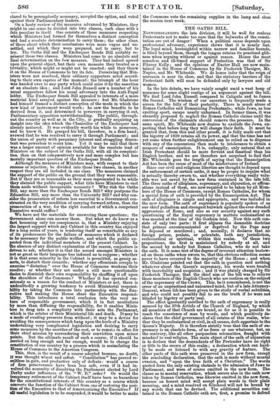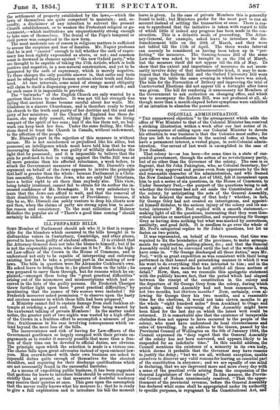THE OATHS BILL.
NOTWITHSTANDING the late division, it will be well for zealous Protestants not to make too sure that the bulwarks of the consti- tution are out of danger ! When a political cause depends upon professional advocacy, experience shows that it is nearly lost. The legal mind, keensighted within narrow and familiar bounds, is blind beyond them, though the tongue retains its practised glib- ness when arguing without or against reason. Hence the most senseless and ill-timed support of Protection was that of Sir Fitzroy Kelly ; and the opinions of Exeter Hall are now main- tained in the House of Commons by Sir Frederick Thesiger, Mr. Napier, and Mr. Whiteside. We do hence infer that the reign of unreason is near its close, and that the statutory barriers of the Protestant faith will soon be defended only by lawyers and old women.
In the late debate, we have vainly sought amid a vast heap of nonsense for some slight vestige of an argument against the bill. We find Lord John Russell compared to Caligula and to James the Second. The wisdom of our ancestors is frequently made a screen for the folly of their posterity. There is much abuse of Roman Catholics and Romani7ing Protestants' while Jews, as less exciting sport, escape nearly unharmed. In former times, it was absurdly proposed to neglect the Roman Catholic claims until the conversion of the claimants should remove the pressure. In the same spirit, Mr. Whiteside now desires to exclude the Jews, ex- pecting that before long they will change their faith. It must be granted that, from this and other proofs, it is fully made out that the bigotry of 1829 retains all its power, and that the time has not yet come when further enlightenment can be relied on to dispense with any of the concessions then made to intolerance to obtain a measure of emancipation. It is, unhappily, only natural that an Irish Protestant should be more fervent and fanatical than his English brother, and we are therefore not surprised to find that Mr. Whiteside goes the length of saying that the Emancipation Act has been the cause of most of the misfortunes of Ireland.
Since our civil and religions liberties are thought to depend upon the enforcement of certain oaths it may be proper to inquire what i actually thereby sworn to, and whether everything really valu- able was not saved by the new form contained in the late bill. The three oaths of allegiance, supremacy, and abjuration, or affirm- ations instead of them, are now required to be taken by all Mem- bers of the House of Commons, except Roman Catholics, for whom, a special form of oath is provided by the Emancipation Act. The oath of allegiance is simple and appropriate, and was included in the new form. The oath of supremacy is popularly spoken of as our chief palladium and strongest bulwark against the ever-dreaded aggressions of Rome, and also as our security against any such questioning of the Royal supremacy in matters ecclesiastical as was mooted at the time of the Gorham trial. Now this oath con- sists of only two parts : it first abjures the damnable doctrine that princes excommunicated or deprived by the Pope may be deposed or murdered ; and, secondly, it declares that no foreign prince, prelate, or potentate, bath any jurisdiction,
ecclesiastical or spiritual, within this realm. Of these two propositions, the first is maintained by nobody at all, and the second by nobody but Roman Catholics, who do not take the oath. It is some test of the degree of reverent attention bestow- ed on these oaths when sworn to, that this obvious reflection seems never to have occurred to the majority of the House ; and when Mr. Gladstone pointed out that the oath in question said nothing whatever about the Queen's supremacy, his words were treated with incredulity and suspicion ; and it was plainly charged by Sir Frederick Thesiger, that the chief aim of the bill was to relieve those members of the English Church who are restless on the subject of the supremacy of the Crown. This, be it remembered, is not the error of an unpractised and unlearned mind, but of a. late Attorney. General, whose life has been given to the study of verbal subtiltiee, and who could not possibly fail to see the truth if he were not blinded by bigotry or party zeal. The effect ignorantly ascribed to the oath of supremacy is really secured by the 37th Article of the Church of England, by which all members of that Church are bound, so far as it is possible to reach the conscience of man by words, and which positively de- clares that the chief government of all estates of this realm, whe- ther they be ecclesiastical or civil, in all causes, doth appertain to the Queen's Majesty. It is therefore strictly true that the oath of su- premacy is an obsolete form, of no force or use whatever, but, on the contrary, like all other purposeless solemnities, fraught with mischief to real religion. The main object of the oath of abjuration is to declare that the descendants of the Pretender have no right or title to the crown of this realm; a declaration which can hard- ly be made or listened to with any gravity of feature. The other parts of this oath were preserved in the new form, except the concluding declaration, that the oath is made without mental evasion, and "upon the true faith of a Christian." The words quoted form the only existing obstacle to the admission of Jews to Parliament, and were of course omitted in the new form. The clause as to mental reservation, which occurs also in the oath now taken by Roman Catholics' was likewise omitted in the new form, because an honest mind will accept plain words in their plain meaning, and a mind resolved on falsehood will not be bound by any words that can be devised. The additional securities con- the settlement of property established by the laws,—which the laws of themselves are quite competent to maintain ; and, se- condly, a disclaimer of any intention to subvert the present Church establishment, or to weaken the Protestant religion or go- vernment,—which institutions are unquestionably strong enough to take care of themselves. The denial of the Pope's temporal or civil power was comprised in the new form.
The most moderate use of reason in religious matters is sufficient to arouse the suspicion and fear of fanatics. Mr. Napier professes that he is not "casuist" enough to tell whether the oath of supre- macy has been rightly expounded as above, or not ; and common sense is drowned in clamour against "the new Oxford party," who are thought to be capable of taking the 37th Article, which is both positive and negative, in a non-natural construction, and yet to be hampered by the oath of supremacy, which is merely negative. To these charges the only possible answer is, that oaths and tests must be adapted to ordinary human notions about truth and false- hood. At rare intervals, some mind of strange moral obliquity will claim to itself a dispensing power over any form of oath ; and for such cases it is impossible to provide.
The "bulwarks" of the English Church are only wanted by a garrison that loves to slumber. It was not till her strength was failing that ancient Rome became careful about her walls. Mr. Gladstone is a sincere Churchman, and is therefore ready to trust his church to the truth and purity of her doctrine and the zeal and piety of her ministers. If the Church of England has these de- fences, she may defy assault, relying like Sparta on the living rampart of the spirit of her sons ; and if she has them not, no bul- wark can keep back her foes. Under the same feeling, Mr. Glad- stone dared to trust the Church in Canada, without endowment, to the affection of the people.
Mr. Disraeli's part in the rejection of this measure is without excuse. He is not uninformed or prejudiced like his allies, but possesses: an intelligence which must have told him that he was encouraging delusion. He was guilty of wilfully darkening the light that he possessed ; and it is impossible to believe that the ; pain he professed to feel in voting against the Oaths Bill was at all more genuine than his affected reluctance, a week before, to attack the Government measures of finance. Mr. Disraeli's own argument on behalf of the Jews appears to involve the principle that half is greater than the whole : because Parliament is a Chris- tian assembly, therefore the Jews, who are only half Christians, have a better right to sit there than anybody else. This view, being totally irrational, cannot fail to obtain for its author the in- creased confidence of Mr. Newdegate. It is very satisfactory to learn that the Jews can afford to wait, and that the removal of their disabilities is the peculiar care of Providence; because, if this be so, Mr. Disraeli can safely venture to drop his clients now and then, when the claims of party are strong upon him to sacri- fice reason and consistency. To the next collection of Hebrew Melodies the popular air of "There's a good time coming" should certainly be added.



































 Previous page
Previous page